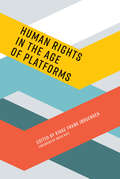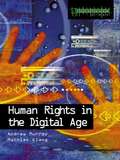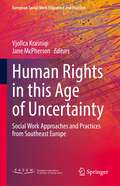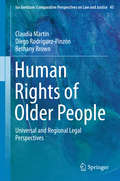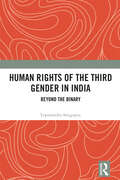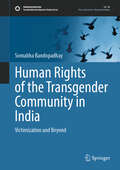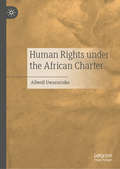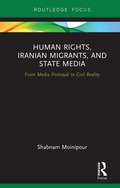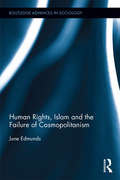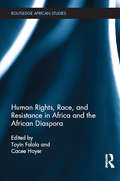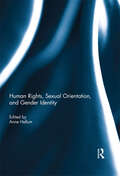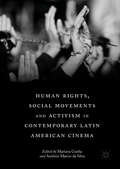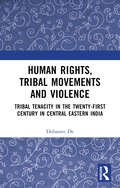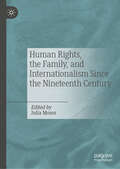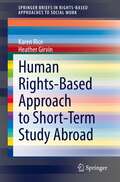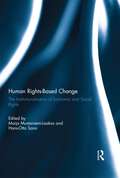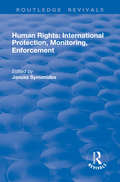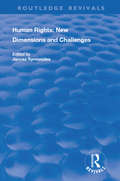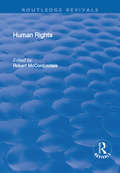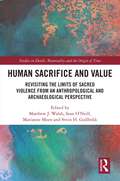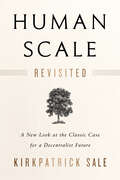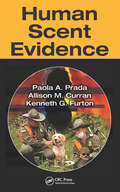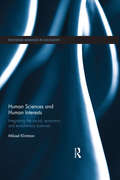- Table View
- List View
Human Rights in War (International Human Rights)
by Damien RogersThis volume is the most comprehensive and up-to-date compilation of in-depth analyses on human rights violations committed in war. It offers myriad perspectives on the content and application of legal protections offered to civilians, including women, children and the elderly, and to others who are ‘no longer active in the fight.’ A series of carefully researched case studies illustrates the extent to which human rights violations occur in recent and current armed conflict, and signals the ways in which these violations are dealt with. Each of the contributing authors has been selected on the basis of their international academic reputation and/or professional standing within the human rights field. Given the alarming numbers of people harmed in recent and current armed conflict, this book will be of great interest to researchers, policymakers and opinion-shapers alike.
Human Rights in the Age of Platforms (Information Policy)
by Rikke Frank JørgensenScholars from across law and internet and media studies examine the human rights implications of today's platform society.Today such companies as Apple, Facebook, Google, Microsoft, and Twitter play an increasingly important role in how users form and express opinions, encounter information, debate, disagree, mobilize, and maintain their privacy. What are the human rights implications of an online domain managed by privately owned platforms? According to the Guiding Principles on Business and Human Rights, adopted by the UN Human Right Council in 2011, businesses have a responsibility to respect human rights and to carry out human rights due diligence. But this goal is dependent on the willingness of states to encode such norms into business regulations and of companies to comply. In this volume, contributors from across law and internet and media studies examine the state of human rights in today's platform society.The contributors consider the “datafication” of society, including the economic model of data extraction and the conceptualization of privacy. They examine online advertising, content moderation, corporate storytelling around human rights, and other platform practices. Finally, they discuss the relationship between human rights law and private actors, addressing such issues as private companies' human rights responsibilities and content regulation.ContributorsAnja Bechmann, Fernando Bermejo, Agnès Callamard, Mikkel Flyverbom, Rikke Frank Jørgensen, Molly K. Land, Tarlach McGonagle, Jens-Erik Mai, Joris van Hoboken, Glen Whelan, Jillian C. York, Shoshana Zuboff, Ethan ZuckermanOpen access edition published with generous support from Knowledge Unlatched and the Danish Council for Independent Research.
Human Rights in the Digital Age
by Andrew Murray Mathias KlangThe digital age began in 1939 with the construction of the first digital computer. In the sixty-five years that have followed, the influence of digitisation on our everyday lives has grown steadily and today digital technology has a greater influence on our lives than at any time since its development. This book examines the role played by digital technology in both the exercise and suppression of human rights. The global digital environment has allowed us to reinterpret the concept of universal human rights. Discourse on human rights need no longer be limited by national or cultural boundaries and individuals have the ability to create new forms in which to exercise their rights or even to bypass national limitations to rights. The defence of such rights is meanwhile under constant assault by the newfound ability of states to both suppress and control individual rights through the application of these same digital technologies. This book gathers together an international group of experts working within this rapidly developing area of law and technology and focuses their attantion on the specific interaction between human rights and digital technology. This is the first work to explore the challenges brought about by digital technology to fundamental freedoms such as privacy, freedom of expression, access, assembly and dignity. It is essential reading for anyone who fears digital technology will lead to the 'Big Brother' state.
Human Rights in this Age of Uncertainty: Social Work Approaches and Practices from Southeast Europe (European Social Work Education and Practice)
by Vjollca Krasniqi Jane McPhersonThis book, grounded in a human rights framework, takes a close look at social work approaches and practices in Southeast Europe. Human rights are central in today's understanding of social work as an academic discipline and as a professional practice. Looking at social work through a human rights lens unmasks inequality and discrimination, promotes ethical engagements, and contributes to the social, political, and economic betterment of society. Moreover, human rights and social work are interdependent and have far-reaching implications at macro, mezzo, and micro levels both in the realm of social policy and in professional practice.This collection of eight chapters provides an overview of human rights practices in social work in Albania, Bosnia and Herzegovina, Bulgaria, Croatia, Kosovo, Romania, and Slovenia. It presents state-of-the-art research on human rights and social work through individual country-focused chapters. In addition, it includes an integrative introductory chapter that identifies and discusses the commonalities and differences across the region as well as future directions.The book takes an integrated approach with conversations among the contributors on three main questions:What is the state of human rights in social work?How are human rights practiced in social work? What are the prospects for an integrated approach to human rights in social work in contemporary Southeast Europe?Human Rights in this Age of Uncertainty is essential reading for social work academics and practitioners in Southeast Europe due to its geographic focus and standpoints from the specific countries of the region. The book also should appeal to a wider European audience (especially as the book features chapters from both inside and outside of the European Union), as well as to an international audience of social work scholars. In addition, policy-makers may find the book a useful resource because human rights discourse features prominently in the international approaches to welfare systems across Southeast Europe as part of the Europeanisation processes currently at play.
Human Rights of Older People
by Bethany Brown Claudia Martin Diego Rodríguez-PinzónThis book focuses on descriptions of the developments in legal frameworks and policies regarding the human rights of older persons. First, it covers the policies adopted and practices developed at the universal system, particularly within the sphere of the United Nations. Second, it includes a side-by-side comparison of the work of regional human rights mechanisms, which have picked up some momentum in the past decade. Through its inclusion of law, policy, and current processes, the widest net possible has been cast to collect a descriptive resource for advocates. Overall, we hope that this book contributes to a better understanding of the current limitations and possibilities that international institutions offer to uphold the human rights of older persons. We expect that this information will allow states and other policy makers to move forward with the international recognition of the human rights of older persons. We know this is only a first effort in compiling and reporting the standards that are being produced by different international institutions. But we have no doubt that many others will follow with their expert analysis of these emerging standards, and that the ongoing discussion will finally crystalize in international human rights binding instruments explicitly recognizing the universal rights of older persons.
Human Rights of the Third Gender in India: Beyond the Binary
by Lopamudra SenguptaThis book engages with the discourses on human rights as they apply to the transgender or the hijra community in India, capturing not only their larger struggle for legal rights and dignity but also their personal hardships. It situates the issues and concerns of the Indian transgender community within a global context to explore the extent of social justice in independent India. By narrating stories of individuals, local movements and activities of groups like the Association of Transgender/Hijra in Bengal (ATHB) and others, the book gives context to the changes that globalisation has brought to the narrative around transgenders in India. This shift has challenged their marginalisation and has led to stories, films and queer individuals like Chapal Bhaduri – the jatra rani – and the iconic filmmaker Rituparno Ghosh to flourish and become relevant. This book brings these literatures and personal stories to the fore, allowing readers to perceive the changes and the challenges that Indian society faces when it comes to ensuring the rights for transgender people. This volume will be of interest to scholars of gender studies, queer studies, literature and social work along with readers who want to engage with the transgender movement and community in India.
Human Rights of the Transgender Community in India: Victimization and Beyond (Sustainable Development Goals Series)
by Somabha BandopadhayThis book records real-life experiences of transgender violence and victimisation, analysing the legal lacunae in granting protection to the historically vulnerable community and their perspective of the law and safety. It is an outcome of extensive empirical legal research conducted in the state of West Bengal, India. With exploration of global scenario of violence, a systematic pattern of victimisation has been identified leading to a reasonable conclusion of internationalisation of transgender violence and victimisation that is largely ignored and is bereft of any legal protection. Premised on the fact that without safety and protection against grave crimes, no amount of civil rights protection is effective, the book provides an account of the ever-increasing gravity of transgender violence and victimisation. Recognising that there is a paucity of research on type of targeted violence against transgender persons, yet even with that scarcity of consistent and reliable reporting to official law enforcement sources, the data that is available from governments, public interest groups, and community surveys about SOGI motivated violence reveals that precarity, prevalence, violence and the harm caused are graver as against other types of crimes and crimes against LGB population,, the author deliberately chose to focus on unearthing violence and victimisation. The culturally sensitive approach to the problem is first of its kind in the legal landscape and expects to contribute to the developing jurisprudence. The book navigates through the transgender jurisprudence to conclude that attempts made by the law-makers across the world is only tokenistic and that the real pulse of the community is far from being recognised in law. The in-depth interviews with law enforcement bodies and transgender activists and victims reveal gaps between laws and realities, whose impact assessment has been attempted in the book to suggest possible best practices to reduce vulnerability and auger empowerment. The book expects to open doors for more legal and interdisciplinary research, in India and abroad by scholars of law, sociology, victimology and others.
Human Rights under the African Charter
by Allwell UwazuruikeThis book critically examines the civil, political, socioeconomic, and group rights protected under the African Charter and its Protocol on women’s rights. It then examines the institutional protection of these rights through the African Commission and African Court. The book builds on the concept of regionalism within Africa and the recent drive for finding “African solutions to African problems” by tracing the development of human rights within Africa and assessing the effectiveness of Africa’s core regional human rights institutions. In turn, it critically analyses the obstacles to the full implementation of human rights in Africa such as the lack of political will, jurisdictional issues, lack of resources and funding, poverty, illiteracy, corruption, and customary practices that violate human rights. In closing, the book discusses possible solutions to these problems.
Human Rights, Iranian Migrants, and State Media: From Media Portrayal to Civil Reality (Routledge Studies in Media, Communication, and Politics)
by Shabnam MoinipourThis book offers a detailed analysis of the Islamic Republic of Iran’s approach towards human rights in the media. It looks at the state-owned and state-controlled Islamic Republic of Iran Broadcasting (IRIB), employing content analysis and multimodal critical discourse analysis to explore its underlying strategies in portraying the international rights norms. The book also features analysis of surveys and interviews of recent Iranian migrants to determine the extent to which the Iranian public is aware of human rights principles and their views on whether and how the international rights norms are portrayed on IRIB.
Human Rights, Islam and the Failure of Cosmopolitanism (Routledge Advances in Sociology)
by June EdmundsCosmopolitanism, as an intellectual and political project, has failed. The portrayal of human rights, especially European, as evidence of cosmopolitanism in practice is misguided. Cosmopolitan theorists point to the rise of claims-making to the European Court of Human Rights (ECtHR) among Europe’s Muslims to protect their right to religious freedom, mainly concerning the hijab, as evidence of cosmopolitan justice. However, the outcomes of such claims-making show that far from signifying a cosmopolitan moment, European human rights law has failed Europe’s Muslims. Human Rights, Islam and the Failure of Cosmopolitanism provides an empirical examination of claims-making and government policy in Western Europe focusing mainly on developments in the UK, Germany, France, Italy and the Netherlands. A consideration of public debates and European law of conduct in the public sphere shows that cosmopolitan optimism has misjudged the magnitude of the impact claims-making among Europe’s Muslims. To overcome this cul-de-sac, European Muslims should turn to a new ‘politics of rights’ to pursue their right to religious expression. This book is a theoretically challenging re-evaluation of cosmopolitan arguments through a rigorous discussion of rights-making claims by Europe's Muslims to the European Court of Human Rights. It combines sociological and legal case analysis which advances understanding of one of the most pressing topical issues of the day.
Human Rights, Race, and Resistance in Africa and the African Diaspora (Routledge African Studies)
by Toyin Falola and Cacee HoyerAfricans and their descendants have long been faced with abuse of their human rights, most frequently due to racism or racialized issues. Consequently, understanding shifting conceptualizations of race and identity is essential to understanding how people of color confronted these encounters. This book addresses these issues and their connections to social justice, discrimination, and equality movements. From colonial abuses or their legacies, black people around the world have historically encountered discrimination, and yet they do not experience injustice opaquely. The chapters in this book explore and clarify how Africans, and their descendants, struggled to achieve agency despite long histories of discrimination. Contributors draw upon a range of case studies related to resistance, and examine these in conjunction with human rights and the concept of race to provide a thorough exploration of the diasporic experience. Human Rights, Race, and Resistance in Africa and the African Diaspora will appeal to students and scholars of Ethnic and Racial Studies, African History, and Diaspora Studies.
Human Rights, Sexual Orientation, and Gender Identity
by Anne HellumHow human rights principles, like the right to gender identity, freedom, integrity and equality, respond to the concerns of different groups of adults and children who experience gender harm due to the binary conception of sexuality and gender identity is the overall theme of this book. The Yogyakarta Principles on the Application of International Human Rights Law in Relation to Sexual Orientation and Gender Identity are analysed in the light of the dynamic jurisprudence of different human rights treaty bodies. Whether and how the status quo of gender duality is reproduced, in spite of international law’s growing recognition of the multiplicity of sexualities and gender identities, is discussed. How transgender men, in countries that permit legal gender change, have been successfully prosecuted for gender fraud by female partners claiming to be unaware of their gender history is given attention. While human rights discourse related to LGBTI persons so far has been moulded on the experiences of adults this book gives voice to the concerns of gender-non confirming children. The jurisprudence of the Child Rights Committee, with focus on the complex social and legal issues faced by gender non-confirming children, is addressed. Through narratives, that give voice to these children’s experiences, the book demonstrates how the legal gender assigned at birth impacts on their feeling of recognition, self-confidence and self-respect in the private, social, and legal spheres. This book was previously published as a special issue of the Nordic Journal of Human Rights.
Human Rights, Social Movements and Activism in Contemporary Latin American Cinema
by Antônio Márcio da Silva Mariana CunhaThis edited collection explores how contemporary Latin American cinema has dealt with and represented issues of human rights, moving beyond many of the recurring topics for Latin American films. Through diverse interdisciplinary theoretical and methodological approaches, and analyses of different audiovisual media from fictional and documentary films to digitally-distributed activist films, the contributions discuss the theme of human rights in cinema in connection to various topics and concepts. Chapters in the volume explore the prison system, state violence, the Mexican dirty war, the Chilean dictatorship, debt, transnational finance, indigenous rights, social movement, urban occupation, the right to housing, intersectionality, LGBTT and women’s rights in the context of a number of Latin American countries. By so doing, it assesses the long overdue relation between cinema and human rights in the region, thus opening new avenues to aid the understanding of cinema’s role in social transformation.
Human Rights, Tribal Movements and Violence: Tribal Tenacity in the Twenty-first Century in Central Eastern India
by Debasree DeThis book sheds light on the issues of structural violence perpetrated against the tribes and analyzes the infringement of human rights of the tribes in the neo-liberal hegemonic context, due to which the tribes are going through massive upheaval – induced displacement and dispossession from livelihood. They are unable to advance their existentialist interests and fulfil their aspirations, because of which they are taking recourse to extremism and get caught into the battle of state sponsored militia and forces on the one hand, and the extremists on the other. The mechanism of structural violence is embedded in the global capitalism, which has its roots in colonialism and imperialism. Tribal movements of the central-eastern India, inspired by human rights exigencies, are up against this imperial project that violates the trajectories of state-led development initiatives for the reason that these movements have been brutally suppressed by the military forces. This has given a political impetus to the tribes for self-assertion. Similarly, tribal activism in the central-eastern India during the twenty-first century addresses the issue of violence in nature and the infringement of human rights in the context of development-induced displacement and the spread of extremism. The book is based on the collection of data from the field investigations done during the last seven years, and it will definitely fill the vacuum in the history of tribal movements in the neo-liberal era.
Human Rights, the Family, and Internationalism Since the Nineteenth Century
by Julia MosesThis book examines one of the key issues shaping global considerations of human rights today: the idea of the family as a protected category. Bringing together historians, political scientists, legal scholars, and historical sociologists, the book investigates how ideas about the family and sexuality intersected with thinking about human rights, for example, through new international law and international institutions; social movements targeting issues related to religion, gender, and sexuality; historical developments such as war and the collapse of empires; and, developments in the social sciences. It features case studies on regions around the globe, as well as on relevant international organisations and individuals who have been influential in this area. In doing so, the contributors to this collection interrogate the relationship between human rights related to the family, and broader debates about rights related to gender and sexuality.
Human Rights-Based Approach to Short-Term Study Abroad (SpringerBriefs in Rights-Based Approaches to Social Work)
by Karen Rice Heather GirvinShort-term study abroad experiences are on the rise across social work programs. This increase is fueled by the Educational Policy and Accreditation Standards of the Council on Social Work Education (CSWE) that social work programs graduate students who are ready to engage diversity and function ethically as global citizens who understand mechanisms of oppression. With the increasing number of short-term study abroad trips, this brief offers a framework that provides strategies for empowering the populations and communities in which these trips occur. Developing short-term study abroad trips from a human rights-based framework rather than a needs-based approach is urgent and necessary, as the community in which the visit will occur is placed at the center of planning efforts and its members become equal and active participants. The brief is accessible and relevant to both instructors and students, with thoughtful emphasis placed in each chapter to align with the needs of each group more distinctly. It is conceived with both travel-based (field education) and classroom learning (pre-trip preparation) in mind. Though developed with more depth, theory, and evidence than a "how-to manual," the brief serves as an exemplary "guide" that prepares those engaging in short-term study abroad trips with information and strategies that are derived from the key concepts of a rights-based approach to field education. Human Rights-Based Approach to Short-Term Study Abroad is essential reading that engages students and faculty with case examples to illuminate the complex concepts that are taught by faculty as well as specific exercises and assignments to guide both faculty and student through the process of developing and implementing short-term study abroad trips. This brief is of immediate relevance for undergraduate and graduate coursework in field education, international social work, human rights, global social work, and macro social work, as well as useful for any practitioner seeking CSWE accreditation.
Human Rights-Based Change: The Institutionalisation of Economic and Social Rights
by Maija Mustaniemi-Laakso and Hans-Otto SanoThis book provides different analytical perspectives into how human rights-based approaches to development (HRBADs) contribute to change. Based on the understanding that HRBADs are increasingly integrated into development and governance discourse and processes in many societies and organisations, it explores how the reinforcement of human rights principles and norms has impacted the practices and processes of development policy implementation. To reflect on the nature of the change that such efforts may imply, the chapters examine critically traditional and innovative ways of mainstreaming and institutionalising human right in judicial, bureaucratic and organisational processes in development work. Attention is also paid to the results assessment and causal debates in the human rights field. The articles discuss important questions concerning the legitimacy of and preconditions for change. What is the change that development efforts should seek to contribute to and who should have the power to define such change? What is required of institutional structures and processes within development organisations and agencies in order for human rights integration and institutionalisation to have transformative potential? This book was previously published as a special issue of the Nordic Journal of Human Rights.
Human Rights: International Protection, Monitoring, Enforcement (Routledge Revivals Ser.)
by Janusz SymonidesThis title was first published in 2003. The series of volumes prepared by UNESCO for teaching human rights at higher education level comes to a conclusion with the publication of this volume. "Human Rights: International Protection, Monitoring, Enforcement" takes an institutional approach to the international protection of human rights, examining first the United Nations system, which may be seen as universal, and then analysing regional systems of protection. A useful source of information on the protection of human rights, the volume can also be employed as a practical guide to the use of existing procedures in the defence of human rights.
Human Rights: New Dimensions and Challenges (Routledge Revivals)
by Janusz SymonidesFirst published in 1998, this first volume of The Manual on Human Rights Education for Universities has been prepared in the hope that it will serve as a teaching aid for institutions of higher education, as well as for UNESCO Chairs, and focuses on new dimensions and challenges. UNESCO’s long experience in this field goes back to 1951, when the first guide for teachers on the Universal Declaration of Human Rights was published. This formed part of UNESCO’s efforts to create a comprehensive system of human rights education, embracing formal and non-formal education. Issues explored include peace, the environment, education, discrimination and extreme poverty.
Human Rights: Sovereignty, Human Rights And The Self-determination Of Peoples (Routledge Revivals Ser.)
by Robert McCorquodaleThis title was first published in 2003. Theories of human rights are important, as they can be a means to challenging entrenched and oppressive power. These key essays take a philosophical approach to human rights, questioning dominant theories and offering different perspectives on their application.
Human Sacrifice and Value: Revisiting the Limits of Sacred Violence from an Anthropological and Archaeological Perspective (Studies in Death, Materiality and the Origin of Time)
by Svein H. Gullbekk Sean O’Neill Marianne Moen Matthew J. WalshThe present volume was made possible by the Norwegian Research Council’s generous funding of the Human Sacrifice and Value project (FRIPROHUMSAM 275947). It explores concepts of human sacrifice. This volume explores concepts of human sacrifice, focusing on its value – or multiplicity of values – in relative cultural and temporal terms, whether sacrifice is expressed in actual killings, in ideas revolving around ritualized, sanctioned or sanctified violence or loss, or in transformed and (often sublimated) undertakings. Bridging a wide variety of interdisciplinary perspectives, it analyses a spectrum of sacrificial logics and actions, daring us to rethink the scholarship of sacrifice by considering the oft hidden, subliminal and even paradoxical values and motivations that underlie sacrificial acts. The chapters give needed attention to pivotal questions in studies of sacrifice and ritualized violence – such as how we might employ new approaches to the existing evidence or revise long-debated theories about what exactly ‘human sacrifice’ is or might be, or why human sacrifice seems to emerge so often and so easily in human social experience across time and in vastly different cultures and historical contexts. Thus, the volume will strike a chord with scholars of sociology, anthropology, archaeology, history, religious studies, political science and economics –wherever interest is focused on critically rethinking questions of sacred and sanctified human violence, and the values that make it what it is.
Human Sacrifice: A Shocking Exposé of Ritual Killings Worldwide
by Jimmy Lee ShreeveWelcome to the terrifying world of ritual sacrifice.Around the world, humans are being trafficked, kidnapped, sold, and enslaved for the specific purpose of sacrifice. Mass-scale migration has seen these gruesome techniques exported from the land of the Aztecs and finding their way to the United States, Britain, and many other locations worldwide. Voodoo priests in London have been linked to ritual murders, and not long ago a Palo Mayombe priestess's New York City apartment yielded its grisly secrets. One New Jersey investigator says that sacrificial rites are not only going on today, but can be traced back ninety years in the States alone.Jimmy Lee Shreeve takes us on a nightmare journey, following the initial investigations of Scotland Yard into the murder of a five-year-old boy whose torso was found floating in the Thames in 2001, and traveling to Africa to unveil a grim trade of exporting humans for sacrifice. He uncovers the dark side of voodoo and muti magic, linked with a score of sacrifices and murders, and in Mexico, finds a devotee of Palo Mayombe responsible for torturing his victims and boiling them in a cauldron. Along the way, Shreeve brings his own brand of offbeat detective skills to the fore, providing startling conclusions to some of the world's most horrific murders. Brutal and disturbing, Human Sacrifice takes us into the dark world of twenty-first-century ritual murder.
Human Scale Revisited: A New Look at the Classic Case for a Decentralist Future
by Kirkpatrick SaleBig government, big business, big everything: Kirkpatrick Sale took giantism to task in his 1980 classic, Human Scale, and today takes a new look at how the crises that imperil modern America are the inevitable result of bigness grown out of control—and what can be done about it.The result is a keenly updated, carefully argued case for bringing human endeavors back to scales we can comprehend and manage—whether in our built environments, our politics, our business endeavors, our energy plans, or our mobility.Sale walks readers back through history to a time when buildings were scaled to the human figure (as was the Parthenon), democracies were scaled to the societies they served, and enterprise was scaled to communities. Against that backdrop, he dissects the bigger-is-better paradigm that has defined modern times and brought civilization to a crisis point. Says Sale, retreating from our calamity will take rebalancing our relationship to the environment; adopting more human-scale technologies; right-sizing our buildings, communities, and cities; and bringing our critical services—from energy, food, and garbage collection to transportation, health, and education—back to human scale as well.Like Small is Beautiful by E. F. Schumacher, Human Scale has long been a classic of modern decentralist thought and communitarian values—a key tool in the kit of those trying to localize, create meaningful governance in bioregions, or rethink our reverence of and dependence on growth, financially and otherwise.Rewritten to interpret the past few decades, Human Scale offers compelling new insights on how to turn away from the giantism that has caused escalating ecological distress and inequality, dysfunctional governments, and unending warfare and shines a light on many possible pathways that could allow us to scale down, survive, and thrive.
Human Scent Evidence (Forensic Science Techniques Ser.)
by Paola A. Prada Allison M. Curran Kenneth G. FurtonDuring the last decade, scientific studies have supported using human scent as a biometric tool and indicator of the presence or absence of an individual at a crime scene. This book focuses on some of these recent advances in the use of human scent as forensic evidence. It examines theories of human odor production, the legal significance of results, and canine scent work from multiple search categories as described in the Scientific Working Group on Dog and Orthogonal detector Guidelines (SWGDOG). It also explores current trends in scent collection techniques, including devices, materials, and storage protocols.
Human Sciences and Human Interests: Integrating the Social, Economic, and Evolutionary Sciences (Routledge Advances in Sociology)
by Mikael KlintmanWithin the disciplines of social, economic, and evolutionary science, a proud ignorance can often be found of the other areas’ approaches. This text provides a novel intellectual basis for breaking this trend. Certainly, Human Sciences and Human Interests aspires to open a broad debate about what scholars in the different human sciences assume, imply or explicitly claim with regard to human interests. Mikael Klintman draws the reader to the core of human sciences - how they conceive human interests, as well as how interests embedded within each discipline relate to its claims and recommendations. Moreover, by comparing theories as well as concrete examples of research on health and environment through the lenses of social, economic and evolutionary sciences, Klintman outlines an integrative framework for how human interests could be better analysed across all human sciences. This fast-paced and modern contribution to the field is a necessary tool for developing any human scientist’s ability to address multidimensional problems within a rapidly changing society. Avoiding dogmatic reasoning, this interdisciplinary text offers new insights and will be especially relevant to scholars and advanced students within the aforementioned disciplines, as well as those within the fields of social work, social policy, political science and other neighbouring disciplines.

